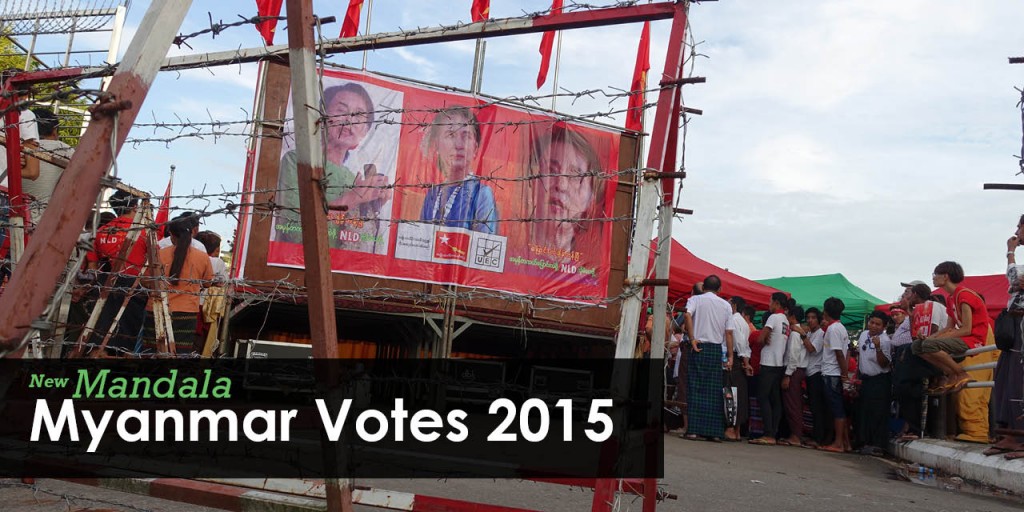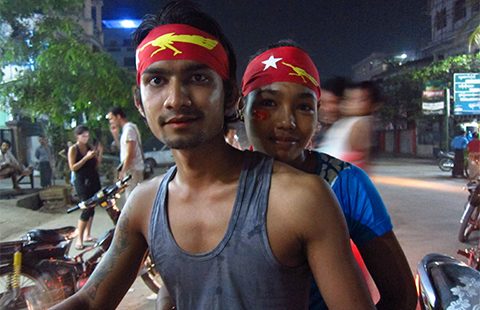
Young people have mixed feelings about Myanmar’s election, but are embracing the democratic transition in other ways.
Young people in Myanmar have a long and troublesome involvement with elite politics.
In 1988 student-led protests catalysed the end of socialism and set the country on a new road, including giving Aung San Suu Kyi her start on the political stage. The memory of this time threatens to subsume their voice in forthcoming elections.
During my time in the country, I have met some impassioned and educated young voters, some enthusiastic yet uninformed, and some who could not care less. This is unsurprising. Even less surprising is the political chemistry of ‘youth’ and ‘students’ in Myanmar.
In Myanmar’s fierce political climate young people are represented and manipulated for political ends.
The education protests earlier in the year, which saw more than 60 people charged and scores of unarmed people hit by police, showed how the memory of student activism is a powerful tool in Myanmar. Following the passing of a new controversial education law, ‘student’ protesters took to the streets.
While some actual students and young people partook, the protests were not indicative of how the majority of young people felt about the education law. Education is a sensitive subject in Myanmar and the protesters invoked the student legacy to whip up fervour.
Politicians recognised the danger of engaging with the protesters. No parliamentary or democratic solution would satisfy them. This revealed a revolutionary element of Myanmar society, and a core of citizens ultimately unwilling to accept democratic solutions.
This revolutionary spirit is not synonymous with students or young people. It would be wise to mind the distinction between young people to these revolutionary stalwarts heading into the election.
Aung San Suu Kyi confirmed she had moved beyond her roots when the NLD distanced themselves from the protests. Dr Thein Lwin, an education activist and member of the NLD Central Committee, participated in negotiations with government for the protesters. He was swiftly removed from the NLD and accused of violating party discipline. The message was clear: activism and protests or democracy and elections.
Aung San Suu Kyi is fixated on elections and politics. The NLD is having difficulty recognising the value of young people and fresh ideas. Playing it safe and keeping politics in the hands of the few at the top might ensure success, but what is success to Aung San Suu Kyi these days? It doesn’t seem to be the same as what young people in her party think it is. Hopefully, once she gets whatever it is she wants, she will refocus and remember what it’s all for.
The democratic transition in Myanmar is, ultimately, for the young people of the country. The country is their future.
Young people in Myanmar may have mixed feelings about the election but they are embracing the democratic transition in other ways.
It is relatively straight forward for the political elite to change a country’s political system; it is less simple to enact a cultural transition. Young people have embraced foreign systems. Whether they participate in the election meaningfully is less important than if they partake in liberalising moral standards and managing the entrance of foreign systems.
The new government will have control over the structural, economic and social framework of Myanmar. To that end, it is important for young people that the parliaments continue to function and pass legislation with their future in mind.
This election may be seen as the last chance for Aung San Suu Kyi to rule the country, but it is the first chance for the country to freely vote for their future. Hopefully, their vote moves the country into a democratic and stable future for young people.
An election marred by personal ambition threatens this process. Even Than Shwe knew dictatorship was not sustainable or profitable for Myanmar’s future.
Jacqueline Menager is a PhD candidate at the Coral Bell School of Asia Pacific Affairs at the Australian National University.
This article forms part of New Mandala’s ‘Myanmar and the vote’ series.
 Facebook
Facebook  Twitter
Twitter  Soundcloud
Soundcloud  Youtube
Youtube  Rss
Rss 